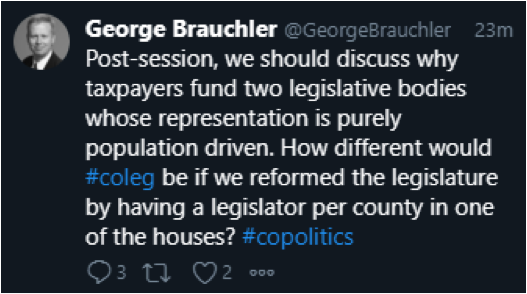Former candidate for Governor and Attorney General George Brauchler took to Twitter yesterday to float an idea seemingly out of nowhere. He said it’s time for Colorado to consider a legislature that has one house apportioned by county rather than population.
This would mirror the U.S. Senate and provide sparsely populated counties with more representation per capita than counties like Denver. Under this scenario, people in San Juan County, population 714, would get one Senator, and the people of Denver, population 705,651 would get one. This would effectively make the votes of people in San Juan County worth 700 times that of the Denver voter.

This might seem like a reasonable concept at first glance. After all, that’s the way we elect U.S. Senators, with each state getting two no matter what their population is. I just happened to be prepping a lesson plan for an American Government class and ran across the Department of Justice’s short history of voting rights in America. It turns out that George’s idea is an old one. In fact, southern states used the concept during the Jim Crow Era—prior to the passage of the Voting Rights Act—to suppress African American influence in their state legislatures.
In 1963, the Supreme Court ruled in Gray v. Sanders that a state court ruling that accepted a system that diluted the influence of highly populated areas violated the Equal Protection clause of the U.S. Constitution. The District Court had held that Georgia was in violation of the U.S. Constitution but also held that states had the right to create malapportioned districts if they show “no greater disparity against a county than exists against any State in the conduct of national elections.”
The Supreme Court overturned the district court decision, holding that:
“The Equal Protection Clause requires that, once a geographical unit for which a representative is to be chosen is designated, all who participate in the election must have an equal vote — whatever their race; whatever their sex; whatever their occupation; whatever their income, and wherever their home may be in that geographical unit”.
Getting back to George Brauchler, who allegedly said recently that he hopes to run for governor again, how could a district attorney—a lawyer, and a man who has run for governor and attorney general—not know that there are several court cases that clearly establish the unconstitutionality of his idea? Where did George get the idea? Why would George be pushing for a legislature mandating that one county’s votes would count 700 times as much as another’s?
Well, the answer is pretty simple: George realizes that the future looks bleak for a Republican Party that has responded to big election losses by digging-in and doubling-down on issues that a strong majority of Coloradans oppose them on. The only way that Republicans can maintain any semblance of power is by gaming the system to dilute Democratic votes and increase the voting power of dirt and land mass at the expense of people. Apparently, George believes that some people don’t deserve equal representation.
While his scheme would likely never meet Constitutional muster, it will surely endear George to the activist base in Colorado GOP circles, who have no problem disenfranchising people they believe will vote against them in elections. As I said, given current political and demographic trends in Colorado, it may be the only way that Republicans can hold onto any levers of power in the state.
I would love to hear George’s explanation for holding such anti-democratic and clearly unconstitutional views, but he seemed unwilling to back up his tweet and was not even willing to acknowledge the clear precedents people pointed out to him that indicate his idea violates the Constitution.
Circling back around to where George might have gotten the idea, is there some effort afoot in the wake of the GOP’s 2018 election losses to bring back clearly unconstitutional ideas for voter suppression with the possibility and hope that a GOP friendly, hyper-partisan Supreme Court will overturn established precedent? I wouldn’t put it past George or the GOP, considering their non-stop efforts to disenfranchise people of color all across the country, and particularly in states where the Supreme Court gutting the preclearance requirement of the Voting Rights Act has led to renewed efforts to disenfranchise people who don’t vote GOP.
George’s goal is not to make our system fairer, it’s to dilute the power of Democratic votes and rule from a minority position.



